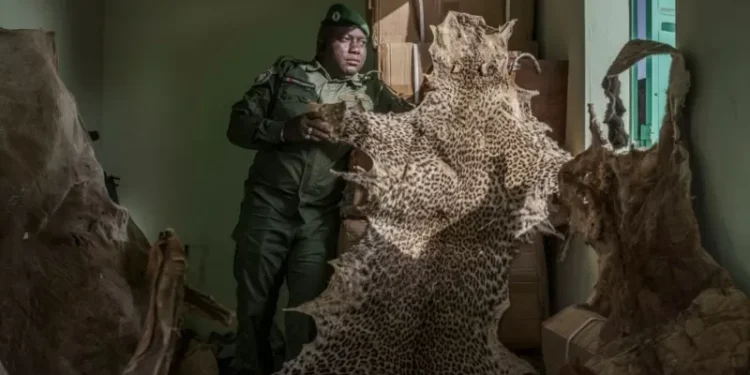Niokolo-Koba National Park, Senegal – a place where the morning sun slants through the lush canopy, creating a picturesque setting for the rangers who march through it. Led by Sgt. Abdou Diouf, these brave men are on a mission to protect the park’s most iconic resident – the critically endangered lions.
Spanning over 9,000 square kilometers, Niokolo-Koba National Park is the last refuge for lions in Senegal. These majestic creatures are facing numerous threats, with poaching being the most devastating one. Despite increased protection efforts, the illegal trade of lion parts is still prevalent, driven by deeply rooted beliefs in the mystical powers of animal skin talismans known as “gris-gris”.
According to a new report by wild cat conservation group Panthera, the demand for gris-gris has led to a surge in the illegal trade of lion and leopard parts, with these products being sold in 80% of the markets surveyed. This has had a devastating impact on Niokolo-Koba’s lion population, with an average of two cats being lost to poachers each year. This is not just a problem in Senegal, as there are estimated to be fewer than 250 adult lions left in the entire West African region.
The allure of gris-gris lies in their perceived power to bring success, protection, and even healing. These talismans are deeply ingrained in traditional African faiths, with Quranic verses and animal parts being combined to unlock their supposed powers. The use of gris-gris is widespread in Senegal, with everyone from police officers to politicians and average citizens wearing them for various reasons.
The reverence for lions in Senegal makes them a particularly sought-after animal for gris-gris. As the national emblem, the image of the lion is seen everywhere in the country, from its coat of arms to billboards and even the national soccer team’s name – the Lions of Teranga. This cultural significance has unfortunately led to a high demand for lion parts, which in turn fuels the illegal trade.
This trade is not limited to Senegal, as the skins are often sourced from East and Southern Africa and smuggled into the country through clandestine routes. These networks are well-established and difficult to dismantle, making it a challenging task for authorities to stop the flow of illegal goods. However, efforts have been made to strengthen security measures, with Panthera investing over $7 million in infrastructure and tripling the park’s anti-poaching force from 20 to 60 agents.
Since partnering with Niokolo-Koba National Park in 2016, Panthera has made significant progress in protecting the lions. The population has doubled since 2017, helping to delist the park as a UNESCO World Heritage Site in danger. However, the battle is far from over, and the fate of these lions ultimately depends on convincing influential religious leaders known as marabouts to change their beliefs and stop prescribing gris-gris made from lion parts.
The challenge is not just about enforcement but also about cultural change. Gris-gris are deeply ingrained in traditional African societies, and it will take a significant effort to shift the mindset and convince people that there are more effective ways to achieve their goals. This is where education and awareness play a crucial role. By educating people about the impact of their actions and promoting alternative solutions, we can work towards a future where lions are not hunted for their body parts.
In addition to addressing the demand for lion parts, there is also a need for stricter laws and penalties for those involved in the illegal trade. The current laws in Senegal, which date back to 1986, are toothless and do not provide enough deterrent for poachers and traffickers. Recent arrests have resulted in minimal sentences, with some offenders receiving just one month in prison. It is essential to update these laws to reflect the severity of these crimes and ensure that justice is served.
As we work towards protecting the lions of Niokolo-Koba National Park, we must also acknowledge the role of traditional beliefs and practices in this issue. It is not about condemning or eradicating these beliefs, but rather finding a way to coexist with them in a way that does not harm the very animals we are trying to protect.
In conclusion, Niokolo-Koba National Park is a symbol of hope for the critically endangered lions in Senegal. It is a place where dedicated rangers like Sgt. Abdou










